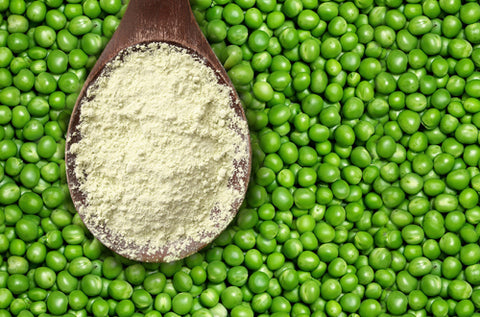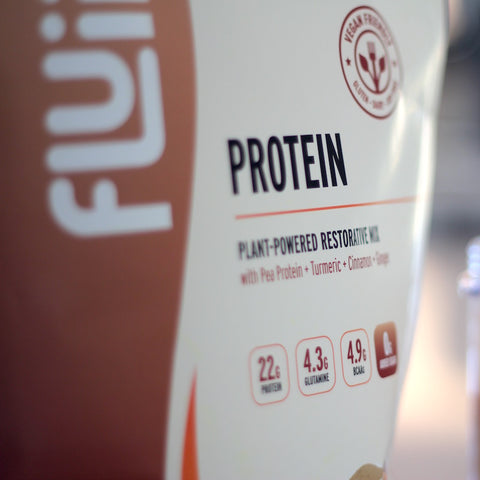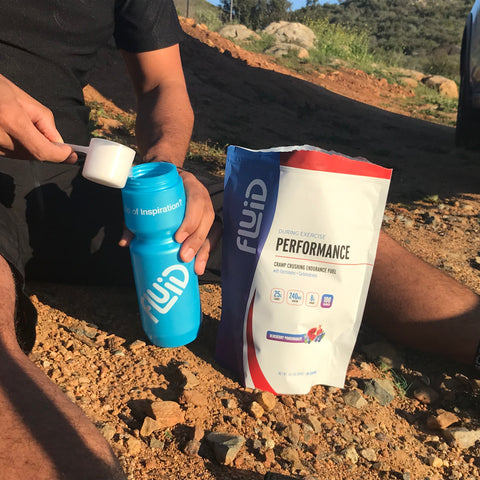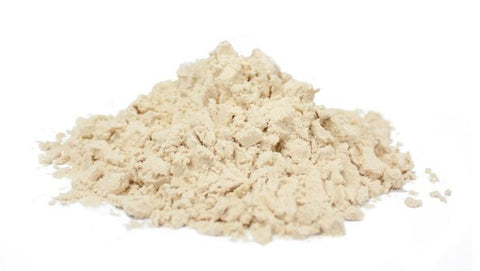
Raw pea protein powder
By now you’ve probably heard about our new Spiced Vanilla Restorative Protein powder, and you may be wondering how we arrived at a protein source from peas rather than a more common like a protein from whey that we use in other products. The story started a few years back when we realized that many of our friends have allergies or sensitivities to dairy proteins, and/or choose to eat a wholly plant-based diet. Thus, they couldn’t enjoy our original Berry, Tropical, and Chocolate Fluid Recovery drinks as they contained whey isolate, a milk derived protein. (Side note – the original formulas, while containing dairy, use whey protein exclusively as whey isolate, not whey concentrate, and therefore are 99.9% free from lactose, however they are not free from milk protein allergens).
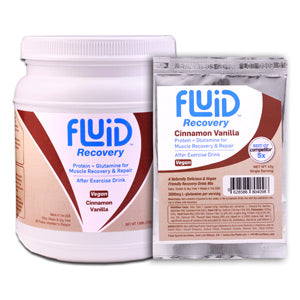
We took this injustice to heart, and in 2016 launched the endurance sport world’s first dairy-free, vegan friendly, Recovery drink mix (the famous Cinnamon Vanilla “Horchata!”) In this product, we tested multiple non-dairy proteins in 2015 and selected pea protein as our substitute for whey protein. So when customers asked us for a better low-carb protein powder, would it again be pea protein or something else? How good is a protein from legumes? What other vegetarian options were even available? Choosing the right protein is no easy task, but our team was up for the challenge.
We re-opened our investigation into our search to find an alternative to what has long been considered the gold standard for post-workout muscle gain and stress-reducing hormone production: whey protein. In our search for a powerful replacement, we found that pea protein checks the two most important boxes for us.
First, pea protein shares a nearly identical amino acid and branched chain amino acid profile with whey protein. This includes similar levels of leucine, isoleucine, and valine (the branched chain amino acids or BCAAs), as well as glutamic acid. BCAAs help kick protein synthesis for muscle repair into overdrive, and glutamic acid is critical for repairing muscle tissue and feeding the cells of the immune system. It’s also high in arginine (three times more so than whey), lysine, and phenylalanine, which are important for muscle repair, immune function, heart health, calcium absorption, and inflammation reduction. Compared to whey, pea protein contains similar levels of all nine essential amino acids, making it the most complete plant-based protein.
| Amino Acid | Amount per 100g of Pea Protein (g) |
Value per 100g of Whey Protein Isolate (g) |
| Alanine | 3.793 | 4.554 |
| Arginine | 7.340 | 2.046 |
| Aspartic Acid | 9.994 | 11.115 |
| Cystine | 0.797 | 2.392 |
| Glutamic Acid | 14.417 | 17.523 |
| Glycine | 3.547 | 1.423 |
| Histidine | 2.199 | 1.700 |
| Isoleucine | 4.292 | 6.685 |
| Leucine | 7.305 | 10.485 |
| Lysine | 7.393 | 9.708 |
| Methionine | 1.095 | 2.038 |
| Phenylalanine | 4.791 | 3.015 |
| Proline | 4.038 | 5.638 |
| Serine | 4.423 | 4.123 |
| Threonine | 3.258 | 6.831 |
| Tryptophan | 0.885 | 2.008 |
| Tyrosine | 3.434 | 3.054 |
| Valine | 4.590 |
5.669
|

Our pea protein is made from
dehydrated non-gmo peas.
Second, (and this may really be the most important factor), the non-gmo pea protein we source tastes great and helps us make a great tasting drink mix overall. Without Fluid’s delicious flavors, even the most powerful protein in the world wouldn’t find its way into your needy muscles. We tried recipes using other plant-based proteins like rice, soy, hemp, and more, but the combination of real cinnamon and natural vanilla tasted best with pea protein. Actually, the aforementioned pea protein-based Cinnamon Vanilla Recovery drink mix is now our most popular Recovery flavor, amazingly eclipsing whey-based Chocolate for top honors. This flavorful feat helped inspire the creation of Fluid Restorative Protein, subtly flavored with cinnamon, ginger, turmeric extract, and vanilla.
So now you’ve got an absolutely delicious recovery drink and supplemental protein powder that are free of animal products, free of soy and gluten, and use the most hypoallergenic protein out there. With no allergens, our vegan Recovery and Protein products are safe for almost everyone, digesting easily without causing belly bloat. Use our vegan Recovery Mix and Restorative Protein just as you would a whey-based version, with one noteworthy difference; pea protein is slightly higher in fiber than whey, making it a tad slower to digest, and may leave you feeling full longer. This could be a good thing if you’re using the Restorative Protein as part of your breakfast – it could help you stay satiated till lunch.
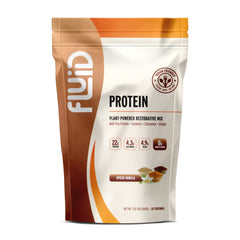
Restorative Mix (2018), Vegan
But, is there any way a vegan-friendly protein can match whey for muscle gains, recovery times, and energy levels? As many vegan athletes already know and non-vegans are discovering, a whole food, plant-based diet gives them everything they need. And it’s not just endurance athletes like ultramarathoner Scott Jurek or Ironman record-setter Hillary Biscay. There are plenty of massive linemen and line backers in the NFL who don’t eat animals or animal products, and who’s going to tell them they’re looking a little underpowered?
If, for whatever reason, you’ve been looking for an alternative to dairy-based whey protein, pea protein is more than a viable option. Give our great-tasting Recovery and Restorative Protein options a try, and, as always, remember to Live Healthy, Live Fluid!

